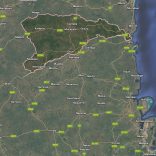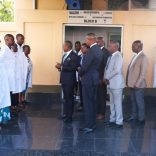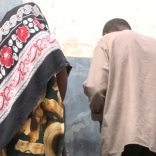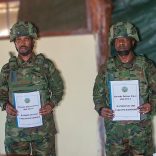Mozambique: Terrorists repelled from Chiúre district after attack - administrator
Mozambique: Insurgents using women in combat action – study

File photo: DW
Women are taking on active roles among the insurgent groups carrying out attacks in northern Mozambique, including combat actions, according to a study seen by Lusa on Monday.
The study on “The Role of Women in the Conflict in Cabo Delgado: Understanding Vicious Cycles of Violence” is by João Feijó, a researcher from the Observatório do Meio Rural (OMR), a Mozambican civil society organisation.
“Women do not fail to analyse the advantages, in material terms and terms of security, that they can draw from collaborating with the different forces in confrontation, depending on each context, sometimes becoming active agents in the conflict,” the research said.
Despite being vulnerable and subject to intense suffering, women are far from being mere passive subjects during armed conflicts.
The study found that the rebel groups operating in Cabo Delgado province rely on women in recruitment, observation (spying) and armed actions.
As in other conflicts, women have minority participation in combat actions in the war in northern Mozambique.
The research points to intimidation and coercion as methods of recruiting women who end up joining the armed groups.
“Due to the distrust [on the part of government forces] of collaboration with rebel groups and, therefore, targets for more violent raids [with reports of robberies, assaults and rapes], women coming from ethnolinguistic groups on the coast of Cabo Delgado province were even more vulnerable,” the study said.
The communities on the coast of Cabo Delgado are mainly Muslim. They have historically had a distant and sometimes hostile relationship with the authorities, accused of protecting and favouring the Makonde ethnic group in the province’s interior.
The research pointed out that violence against women is common in armed conflicts, and Cabo Delgado is no exception.
“Reports reveal that women were victims of abduction and rape and also subjected to assaults”.
Deprivation of economic activity, theft and destruction of property are also other forms of violence inflicted on that population group in the war in Cabo Delgado.
“The limitation of access to health, through destruction of sanitation facilities and the abandonment of medical personnel, further aggravated the assistance of displaced populations with injuries, but also the provision of maternal and child care, treatment of cholera, diarrhoea and malaria with often fatal consequences,” the study says.
In an interview he gave to Lusa in April, João Feijó said that reports of 23 kidnapped women who escaped from rebel bases in northern Mozambique reveal an organised group recruiting child soldiers and hints at trafficking girls abroad, according to a new study.
“What leads us to raise this hypothesis is the number of women who have been kidnapped,” especially in 2020, says João Feijó.
There are reports of “hundreds of women” kidnapped during the attack on Mocímboa da Praia over a year ago, “the same thing in August” when the town was taken. In the same way in other attacks, the paper says, “Characterisation and social organisation of the ‘machababos’ [insurgents] from the discourses of kidnapped women”.
“If we are to add up [all the incidents], we find there are many hundreds of women, which would raise a logistical problem of feeding and exposing the group itself in military terms”.
On the other hand, “there is the testimony of the most beautiful girls who, after an indoctrination session, come to tell their colleagues that they were selected to go to Tanzania to study”.
The researcher and the OMR team believe that their destination is networks of trafficking in women that extend to Europe and the Persian Gulf, so the study suggests, among other measures, strengthening border controls.
The kidnapped women who have been in insurgent bases have also seen “children and teenagers doing military training and fighting with machetes”, as well as “young men in the group for two and three years, eager for their first mission”.
Armed groups have terrorised the northern province since 2017, with some attacks claimed by the ‘jihadist’ group Islamic State, in a wave of violence that has led to more than 2,800 deaths according to the ACLED conflict registration project and 714,000 displaced people according to the Mozambican government.
The number of displaced increased with the attack on the village of Palma on 24 March, an incursion that caused dozens of deaths and injuries.
The flight from Palma continues and has caused close to 68,000 displaced persons.
The Mozambican authorities announced they were controlling the town. Still, shootings have continued, and the situation has led the oil company Total to abandon indefinitely the site of the enterprise that was scheduled to start production in 2024 and on which many of the expectations of economic growth in the next decade are anchored.
- You may read, download the full study by João Feijó, in English, HERE.












Leave a Reply
Be the First to Comment!
You must be logged in to post a comment.
You must be logged in to post a comment.